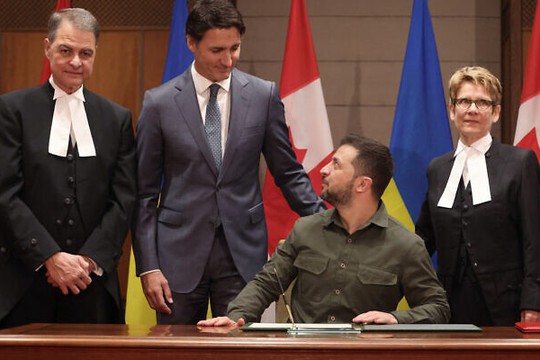Ukrainian President Volodymyr Zelensky, Canadian Prime Minister Justin Trudeau, Speaker of the House of Commons Anthony Rota (L) and Speaker of the Senate Raymonde Gagne (R) take part in a signing ceremony on Parliament Hill in Ottawa, Canada, on September 22, 2023
Photo: AFP
In 1967, Canada’s justice minister was asked to strip citizenship from a former Nazi who had been sentenced to death in the Soviet Union. The minister, Pierre Trudeau, declined to do so. Although the USSR had convicted the Latvian man of murdering Jews in the Holocaust, Trudeau argued that Canada had not erred in granting him citizenship when he first applied, writes ‘The Time of Israel’.
Trudeau’s response was revealed last week when the Canadian government — now led by his son, Prime Minister Justin Trudeau — unsealed documents related to the resettlement of Nazi war criminals in the country. The revelations have come months after a political crisis surrounding the continued presence of former Nazis in Canada.
The documents were part of the Rodal Report, compiled in 1985 and released in heavily redacted form in 1987. They were put together by a Jewish historian named Alti Rodal, who was born in Ukraine and is the daughter of Holocaust survivors. The report was compiled as part of a broader effort, the Deschênes Commission, to investigate Nazi war criminals in Canada.
The documents show that the elder Trudeau, who became prime minister in 1968 and held that role almost uninterrupted until 1984, warned of dangerous implications were Canada to revoke the citizenship of the Latvian man, known as Subject F.
Convicted in absentia in the Soviet Union of leading a firing squad that was responsible for the deaths of 5,128 Jews, Subject F had been sentenced to death. If Trudeau advised revoking his Canadian citizenship, he could have been deported and executed.
According to the Rodal Report, the Canadian Jewish Congress made further attempts to get Subject F deported but was unsuccessful. Subject F died in Toronto in 1983, according to the report.
Trudeau’s ruling came at an intense moment during the Cold War in which acceding to the extradition demand of the Soviet Union would represent a political compromise.
“It’s hardly surprising that, as the minister of justice, he wasn’t just thinking legally, he was thinking politically,” David Matas, B’nai Brith Canada’s senior legal counsel, told the Canadian Broadcasting Corporation earlier this month about Trudeau. He added, “The bringing of mass murderers to justice should not be sidetracked by political considerations.”
Efforts to make the documents public gained urgency shortly after B’nai Brith requested them when, last fall, a top Canadian lawmaker invited a former Nazi soldier to attend Ukrainian President Volodymyr Zelensky’s speech at Parliament. The speaker of the House of Commons, Anthony Rota, subsequently apologized and resigned, saying he did not know that the man he invited, 98-year-old Yaroslav Hunka, had volunteered with the Waffen SS Galicia Division in Ukraine during World War II. Ahead of Zelensky’s speech, Rota called Hunka “a Ukrainian hero, a Canadian hero, and we thank him for all his service.”
Jewish advocacy groups, including B’nai Brith Canada, immediately condemned the acclaim given to Hunka. B’nai Brith, which has been advocating for the release of the complete findings of the Deschênes Commission since the 1980s, applauded the Rodal Report’s declassification.
“We welcome this almost complete disclosure of the Rodal Report,” Matas said in a statement. “It is now close to 79 years since World War II and more than 37 years since the completion of the Rodal Report. Yet, in light of ongoing mass atrocities in many locations on this planet, and the efforts of many perpetrators to seek a haven in Canada, this Report has contemporary relevance.
read more in our Telegram-channel https://t.me/The_International_Affairs

 11:35 12.02.2024 •
11:35 12.02.2024 •























